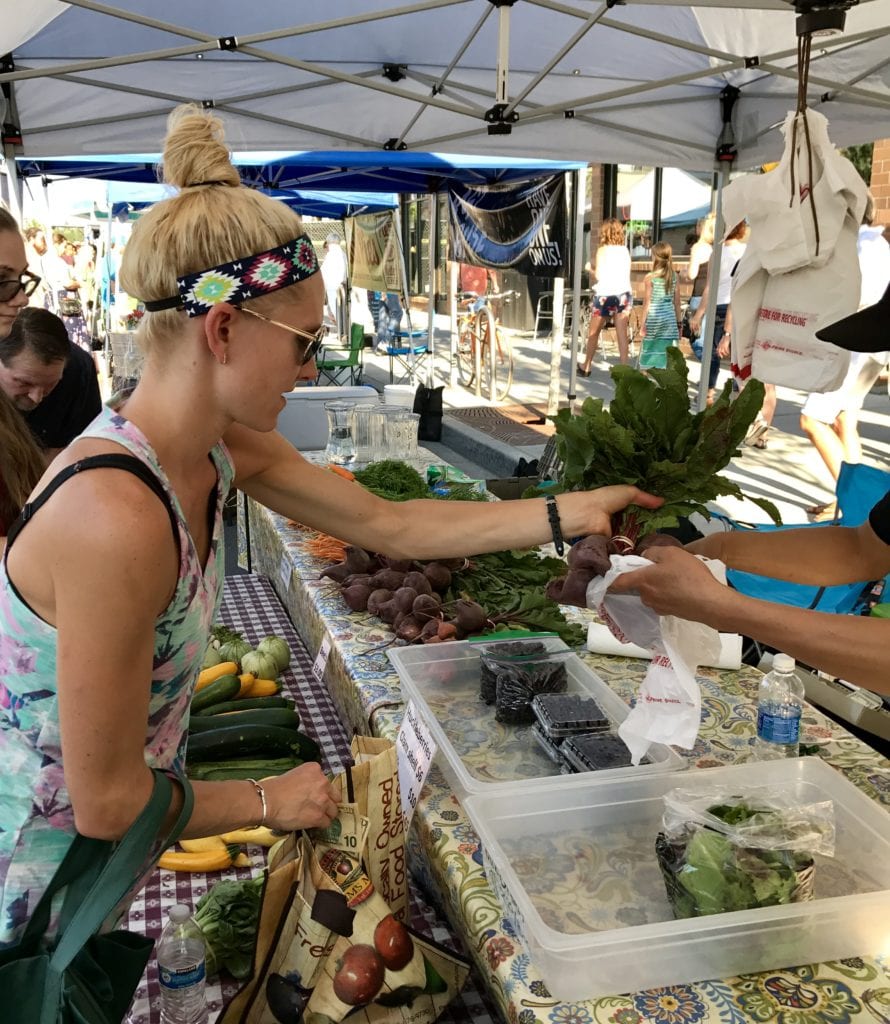Summer brings the best in produce availability, especially here in the Inland Northwest. Where I live, I am blessed to have many options for great, local produce because of our longer growing season. While we are not the south by any means, we still have the luxury of great gardens and Farmers Markets.
I grow much of my own food during the growing season and I support local farmers for the other produce and product I need. I do this to support local economy, reduce my carbon footprint and to promote biodiversity. Eating seasonally has it’s advantages both for health, the wallet and the environment. I preserve a lot during the summer months for use in the winter.
Farmers Markets are a sprouting up everywhere in my region. I have many options within 20 minute drive from my house, all throughout the week. It’s a great way to get the kids outside to enjoy the sunshine, go for a walk and I get the benefit of nutritious, seasonal and local food. It’s a win for everyone. And most of the Farmer’s Market have bakeries and local ice cream trucks or Posicles for sale, if I feel so incline to treat myself and the family.
If you have access to Farmer’s Markets, GO. If you are scared that you don’t know how to navigate them or what to expect, then read the following tips to help make your Farmer’s Market a success, both for you and the local farmers.
GO Early – Especially if you want to talk to the individual farmers and learn more about their farm and produce. Also, when you arrive early you get the best pick of all the produce and product. If it’s a busy weekend, farmers may run out of some of their produce / meat / breads, etc. To get the best pick arrive within an hour or so of the market opening. You’ll also avoid the long lines and rush of people, making it easier to walk around browse through the vendors and feel less rush. It’s easier for farmers to talk when there’s not a slew of other customers to serve as well, so if you have questions, go early.
Ask Questions – Again go early to beat the lines and to have time to chat with the farmers, so they are available for questions. They are more easily available to chat about their product and farms, when there’s not a crowd of other people to serve. Most will be happy to share how they grow their products and to educate you on their farm and practices. Just because their produce isn’t labeled organic, doesn’t mean it’s not healthy or sprayed with pesticides and toxins. They may not have the means to afford the organic label yet but don’t spray and grow “organic.” Just ask. Some use nutritional farming others do crop rotation. You can also ask pointers for your own garden if you have questions on soil health and getting rid of bugs naturally. I’ve learned many tips from my local farmers.
Know Your Growing Seasons – There’s nothing more annoying then being asked for peaches in June (here in the inland northwest they aren’t ready until August and early is mid – late July). It’s similar to being asked how far a marathon is? I hate that question, because it’s the same distance every marathon, but yet I get asked “How far was that marathon?” Farmers are busy at farmers market and don’t always have time to answer questions, especially those types of questions. If you come looking for tomatoes in early June, you’ll be out of luck. Just know there’s different growing season, and you can ask farmers if their garden is late or early (depending on the spring, the garden may be ready earlier), thus some items may be a little late or early.
Bring Lower Bills – Some farmers markets will let you use your debit card to buy “farmers markets” bucks that are only good at the said farmers market. Otherwise bring cash, and bring lower dollar bills, $5s, $10s & $20s. These are easier to break and work with. There may be an ATM for use, but this isn’t likely in the smaller towns.
Bring Your Own Bags – Having reusable bags makes it easier to lug around your goods and farmers don’t supply you with grocery bags, only bags needed for bagging their items. Keeping the plastic or paper bags you received your produce in for the next trip is helpful as well. You save the farmers time and money, as well as save the environment.
Thank Your Farmers – Let your local farmers know you appreciate them and all their hard work. It takes time to grow food. I only have a garden a fraction of the size, and it’s a lot of work to upkeep. There’s a lot that goes into a garden on that large of a scale and most don’t have the resources to hire out, so its the family doing all of the work.
Come Ready to Spend & Come with an Appetite – Not only is produce available, there’s meats, local honey, beautiful bouquets, breads, local coffee, lotions, soaps and salsa. You’ll find great variety at most farmers markets, and it’s common for local food vendors to be in attendance too. So you if you are hungry you can enjoy something sweet or savory. From wood fire pizza to burritos or crepes. Most are local vendors and some use their own ingredients grown on their own farms.
7 Tips for Navigating the Farmers Market #eatlocal #growyourownfood #healthtips Share on XHave a great weekend!!
Until Next Time Be Whole & Be Fit
What’s your favorite part about Farmers Markets?



[…] 7 Tips For Navigating The Farmers Market – Things to know before you go. […]